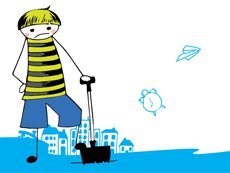What happens if my parents can’t take care of me?
When parents or the people responsible for a child are unable to provide protection or care, the State is to do so. Adult decisions must promote the welfare of the children affected by the decisions. (Article 3)
Thus, a child who cannot live with his or her family has the right to protection and aid from the State. The child may be placed in a family or in an institution for children, where the child’s religion, culture and language must be respected. (Article 20)
When a child can no longer live with his or her parents and acquires new parents, this is referred to as “adoption.”
Adoption must take place in the framework of the law, and may occur only if adoption improves the child’s life. Adoption is permitted only if the parents, legal representatives and all other persons concerned have given their informed consent. These people do not have the right to extract profit from the adoption (for example, by receiving money). (Article 21)
When a child is not living with his or her family (but, as the case may be, in a hospital, foster family or institution for children), his or her situation must be re-examined regularly to ascertain whether the living conditions remain optimal for the child. (Article 25)
Next article:
Average Rating: ☆ ☆ ☆ ☆ ☆ (0 reviews)



